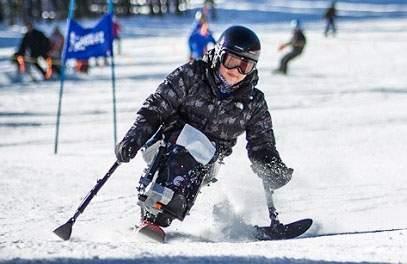Skiing is a thrilling and fun activity for many people. The beauty of this sport is that it is extremely user-friendly, allowing even persons with a physical or intellectual disability to participate. If you have dreamt of hitting the slopes, alone or in the company of friends and family, don’t let your disability stop you.

Alpine skiing can give you a heady sense of freedom and a fluidity of motion that is rarely accessible to persons with a disability. Learning how to ski and mastering this skill can help you build confidence and foster a deep sense of accomplishment and satisfaction. Additionally, you will get to participate in a fun recreational activity that provides special camaraderie with your family and peers.
It is understandable to have reservations about skiing if you are a beginner. However, it is important to keep in mind that many people with different disabilities still manage to enjoy themselves while skiing. It doesn’t matter if you are an amputee or paraplegic, if you are visually or hearing impaired or are confined to a wheelchair, you too can experience the sheer joy of skiing down a mountain slope.
There are many different skiing holiday activities for you to participate in. You can choose to go snowboarding, snowshoe walking, skating, sledging or skiing. Alternatively, you can opt to delight in a husky dog or sleigh ride or simply sit back and let the magic of the mountains soothe you as you enjoy a cup of hot chocolate.
Special equipment and requirements
In order to make your holiday as enjoyable as possible, you need to know what special skiing gear or equipment you will require, as well as the best holiday resorts offering adaptive skiing holidays for persons with disabilities.
Make sure that the resort offers adaptive assistance and has qualified adaptive ski instructors to teach you the ropes if you are a novice. These days there is a selection of adaptive skiing equipment available and you will need expert advice to select equipment that is best suited to your needs.
If you have significant physical or visual limitations then a sit-ski would be perfect for you. Mono-skis and bi-skis are best for double amputees or for people with spinal cord injuries. If you have had a single leg amputation or an injury affecting only one leg, three-track skiing might be more to your speed. If you have good leg strength and normally get around using a cane or crutches, four-track skiing might be your thing. These are just basic guidelines and an instructor should help you learn how to handle any equipment you require for smooth skiing.
Before hitting the slopes, remember to purchase adequate safety gear such as helmets, gloves and goggles. You will also need a sturdy pair of ski boots for downhill skiing and to keep your feet warm. Make sure that these are well matched to the size and shape of your feet for maximum comfort.
Proper preparation will help ensure that you have a relaxing and rejuvenating skiing holiday. Regardless of the activities you choose to indulge in, stay safe, enjoy yourself and have a good time.
